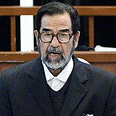
Master Sgt. Robert Ellis, who from January 2004 until August 2005 was the senior medical adviser at the compound near Baghdad where Saddam Hussein and other “high value detainees” were jailed, told the St. Louis Post-Dispatch that the tyrant’s refusal to wear a hood during his execution was ‘typical Saddam.’
”Saddam was gangsta’,” he told the American newspaper.
According to the St. Louis Post-Dispatch report, Ellis had been called up in late 2003 from the Army Reserve and had no idea what his mission would be.
A colonel told him directly: “Saddam Hussein cannot die in US custody. You do whatever you have to do to keep him alive,” the report said.
”That was my job: to keep him alive and healthy, so they could kill him at a later date,” Ellis told the Post-Dispatch.
Ellis took care of a tyrant and in doing so, he heard Saddam read his poetry, talk about his children and wonder about the fate of his country, the report said.
Ellis told the Post-Dispatch that he would check on Saddam twice a day and write a thorough “situation” report daily about the dictator’s physical and emotional status.
According to the report Saddam told Ellis that smoking cigars and coffee kept his blood pressure down, and it seemed to work. Saddam would insist that Ellis smoke with him.
At one point, Ellis told the Post-Dispatch, Saddam went on a hunger strike, refusing to eat when the guards would slide food through the slot on the bottom of his door.
But when they changed tactics and opened the door, he started eating again, Ellis recounted.
”He refused to be fed like a lion,” the American nurse said.
'This could mean that violence there will continue'
For a while, when he was allowed short visits outside, Saddam would feed the birds bread saved from his meals; he also watered a dusty plot of weeds,” Ellis said.
”He said he was a farmer when he was young and he never forgot where he came from,” Ellis was quoted by the Post-Dispatch as saying.
According to the report, Ellis’ patients also included Ali al-Majid, Saddam’s cousin who has been nicknamed “Chemical Ali” for allegedly gassing Kurds.
Ellis told the Post-Dispatch that Saddam also talked to him about happier times when his children were young: How he told them bedtime stories and how he would give his daughter half a Tums when she complained of a tummy ache.
After Ellis got an emergency call from America that his brother was dying, he told Saddam he was leaving immediately; before he left, Saddam hugged him and said he would be his brother, the report said.
”When he was with me, he was in a different environment,” Ellis told the Post-Dispatch. “I posed no threat. In fact, I was there to help him, and he respected that.”
Saddam never discussed dying and expressed no regrets about his rule,” the nurse said.
”He said everything he did was for Iraq,” Ellis was quoted by the Post-Dispatch as saying. “One day when I went to see him, he asked why we invaded. Well, he made gestures like shooting a machine gun and asked why soldiers came and shot up the place. He said the laws in Iraq were fair and the weapons inspectors didn’t find anything.
”I said, ‘That’s politics. We soldiers don’t get caught up in that sort of thing,’” Ellis told the newspaper.
Ellis told the Post-Dispatch that he knows the dictator got what he deserved, but he worries that the execution may make him a martyr in the eyes of his supporters.
”This could mean that the violence there will continue,” he said.















